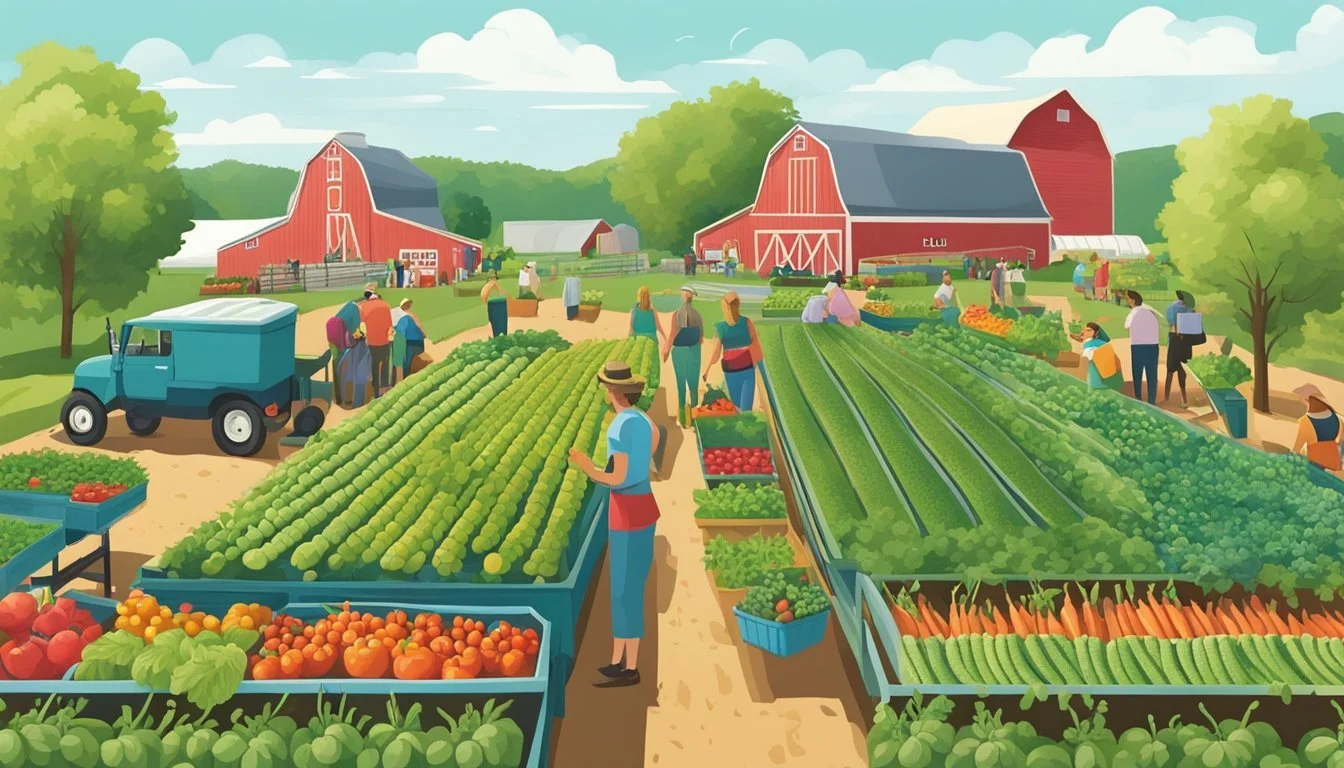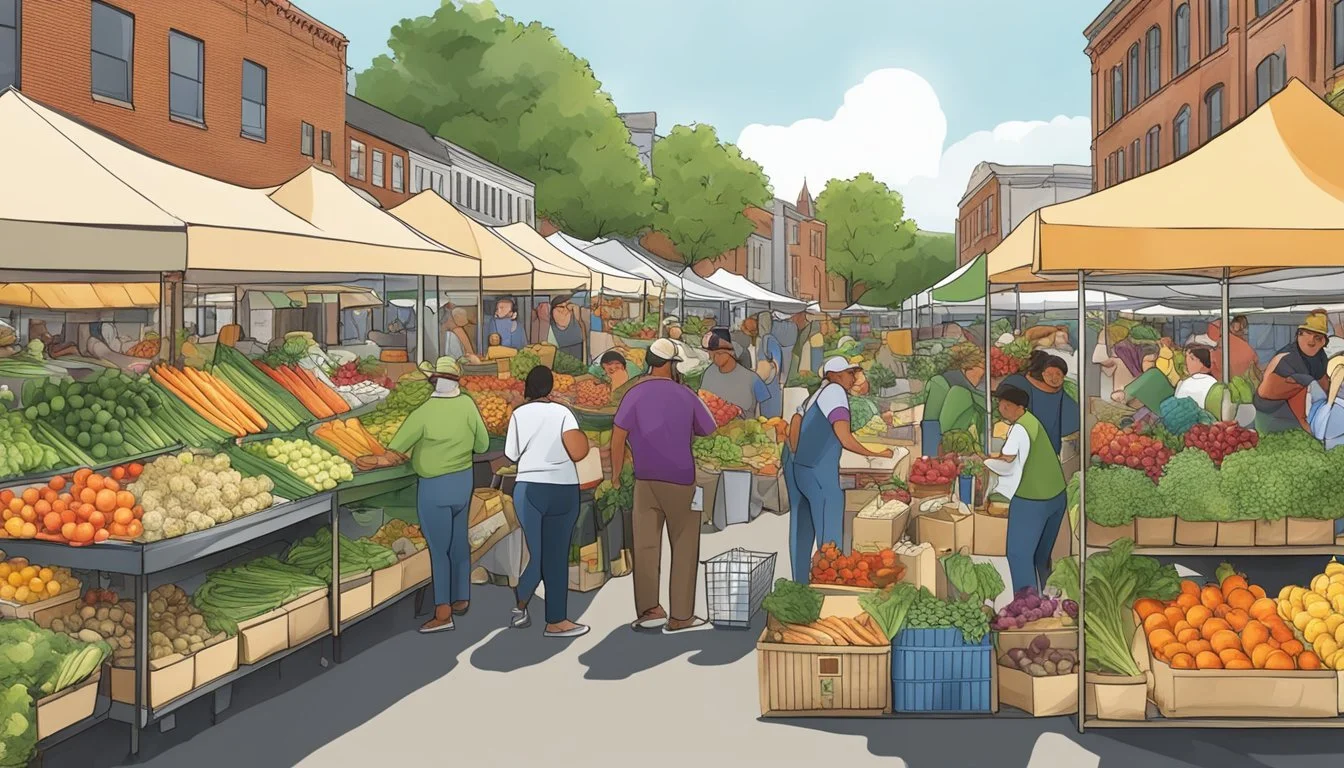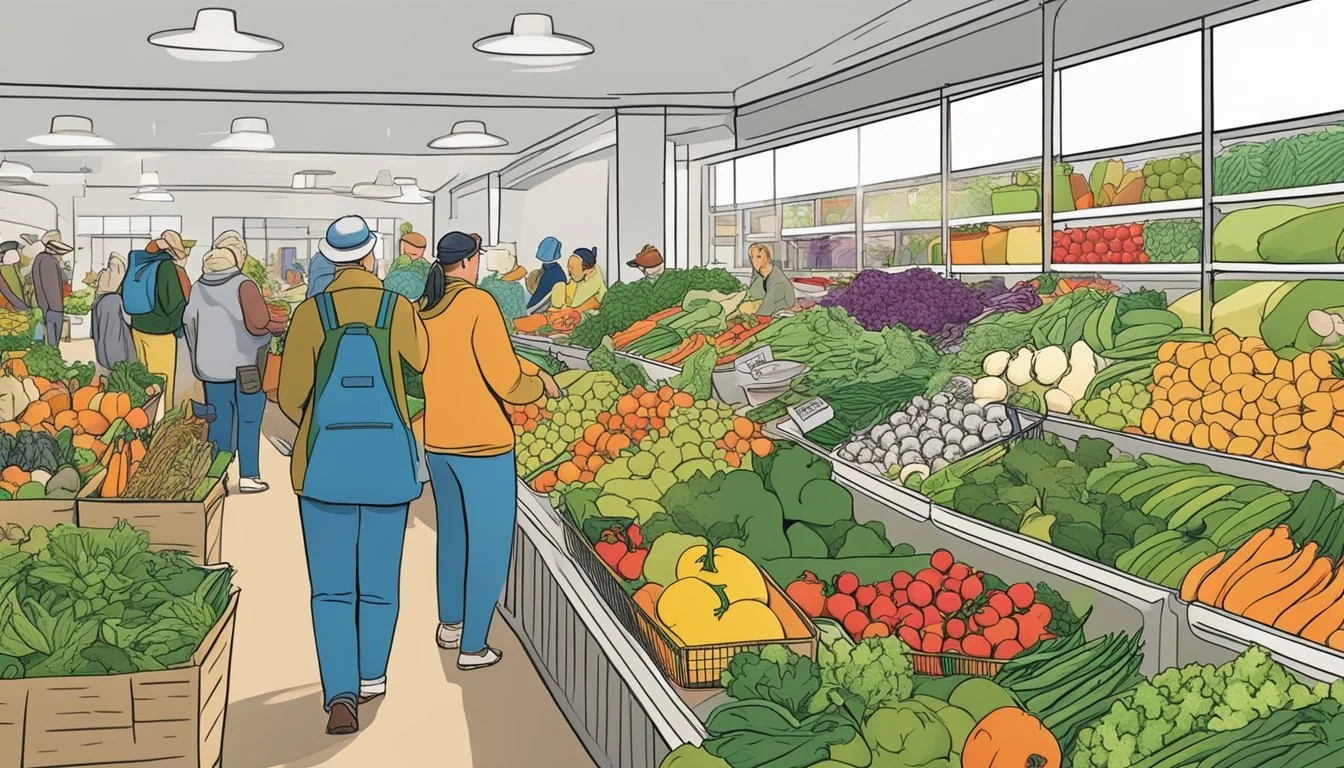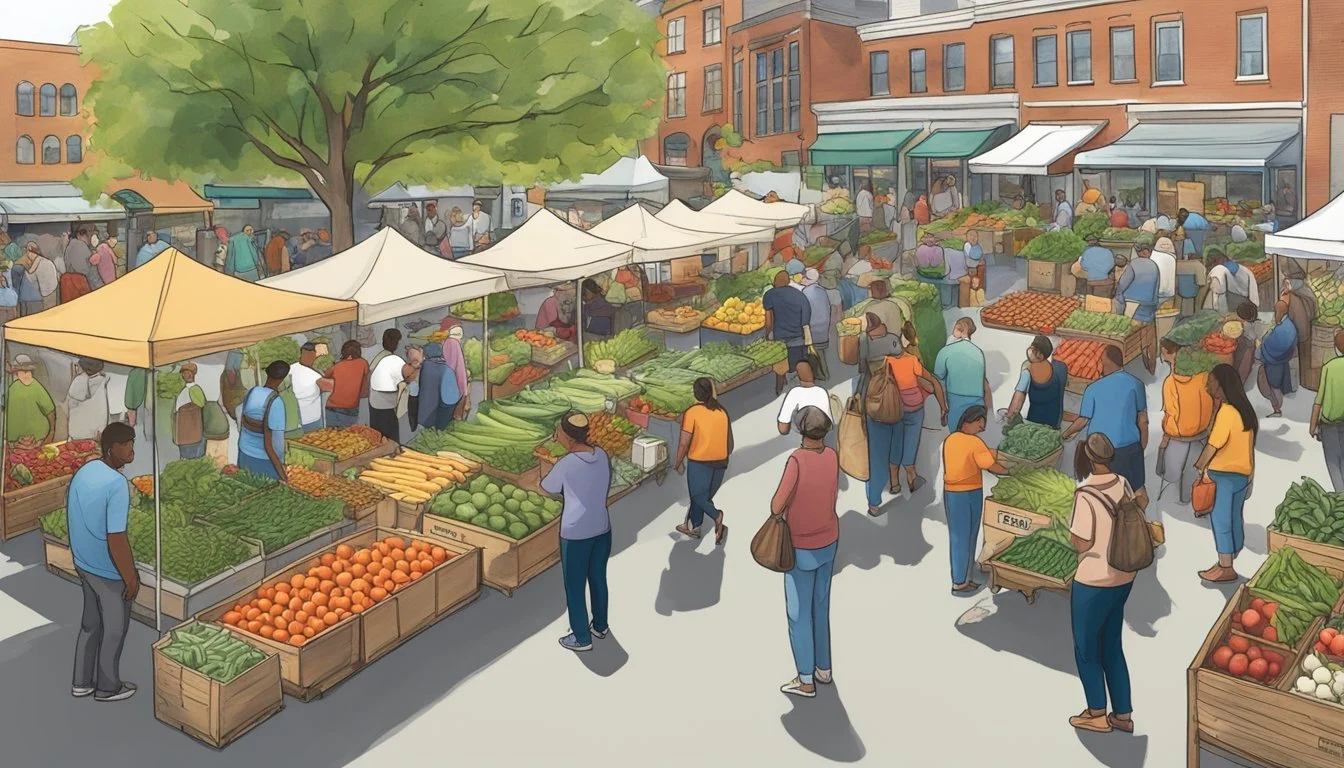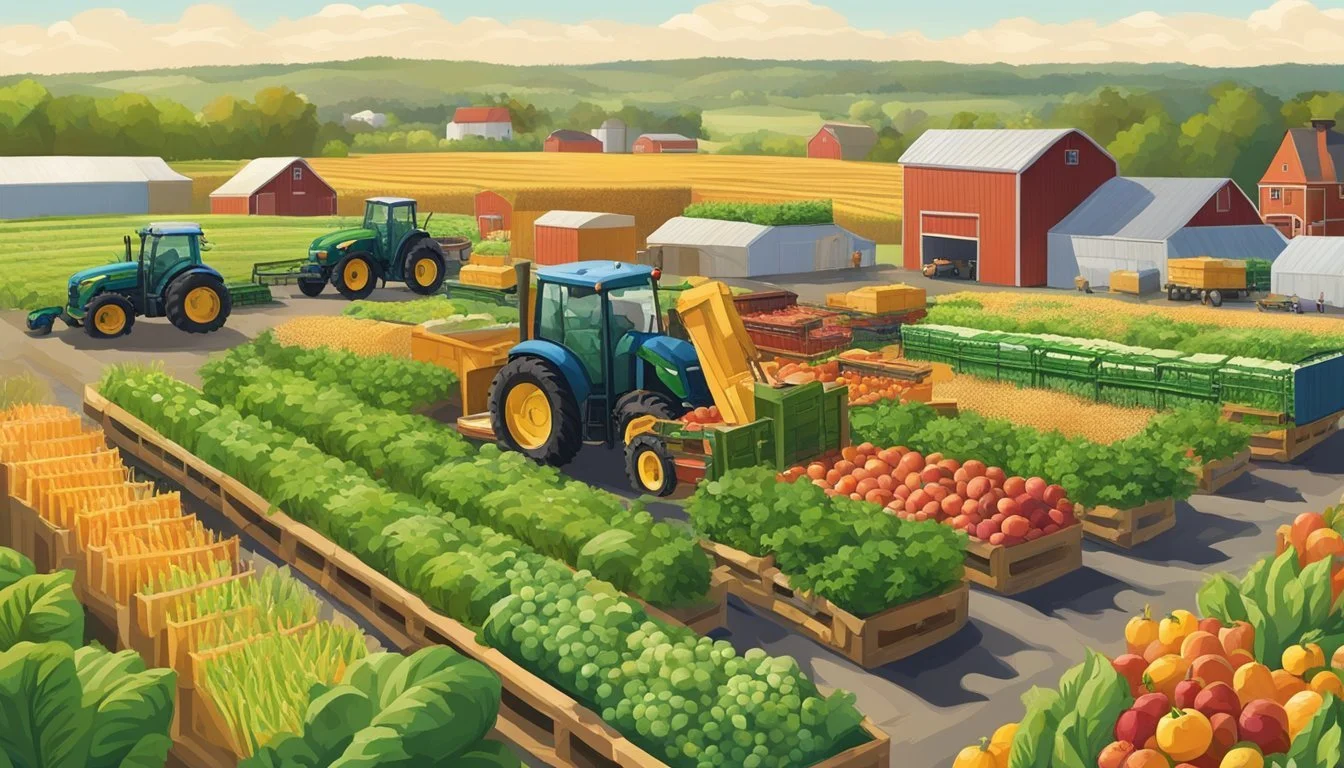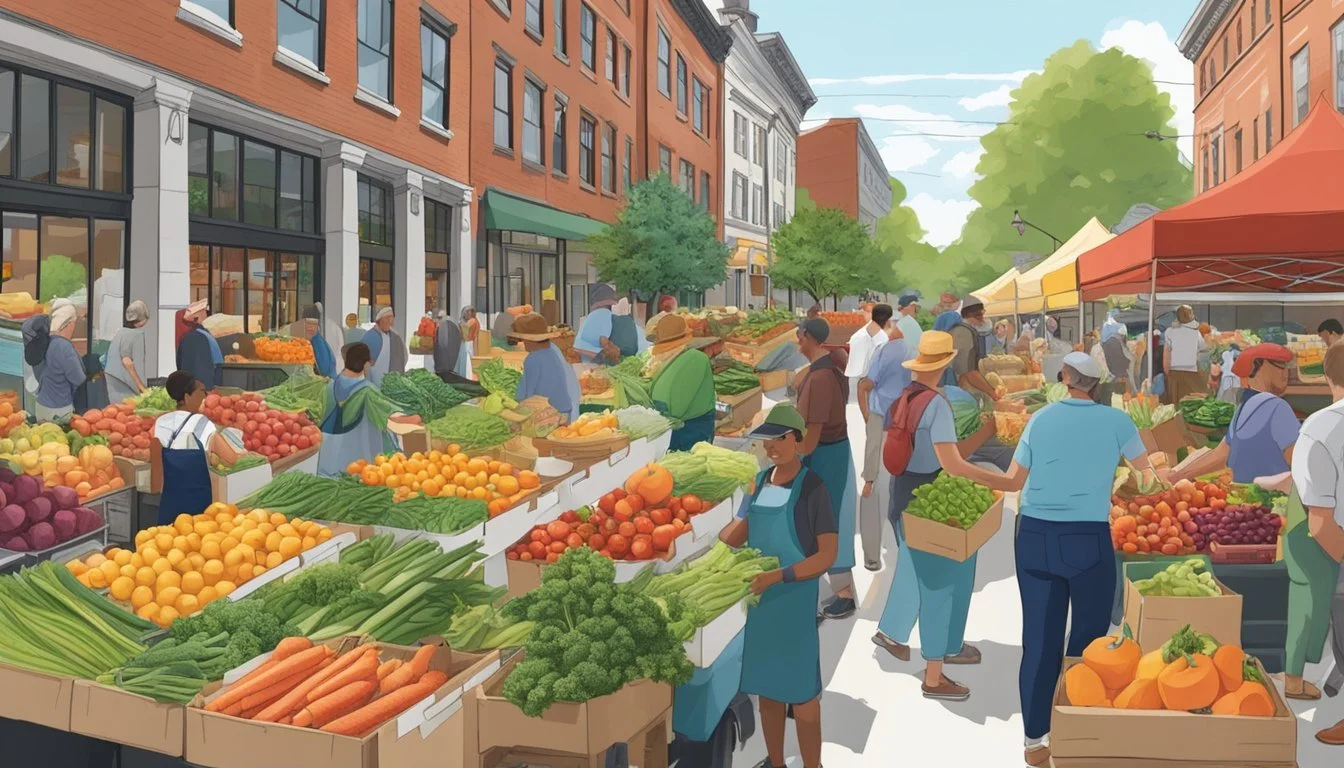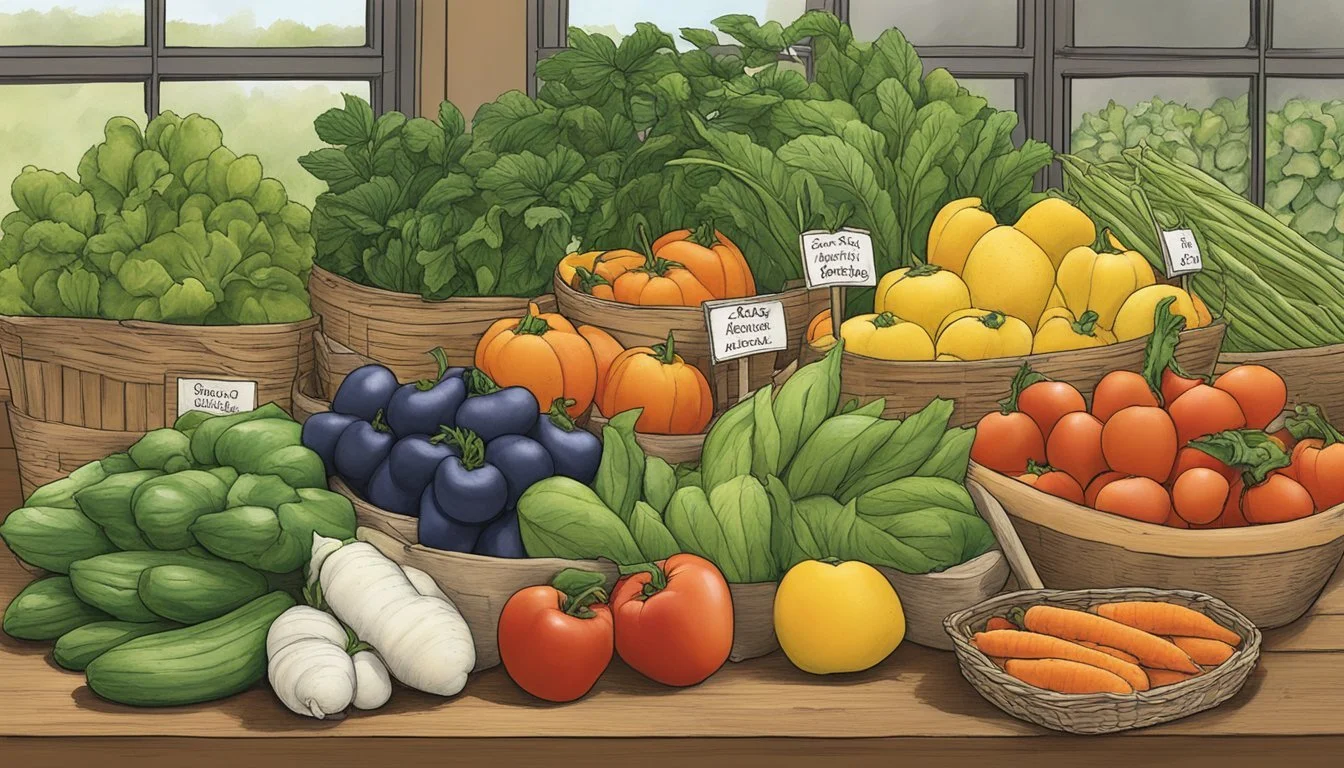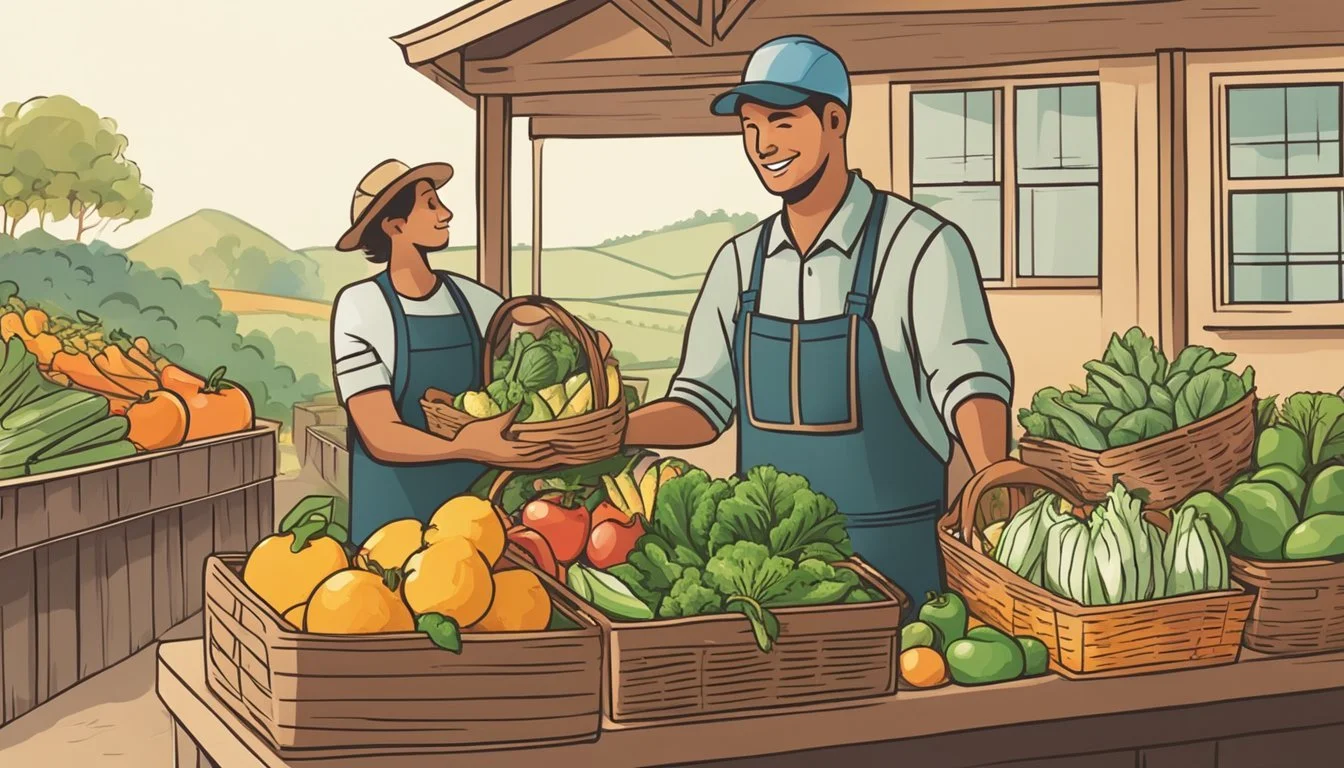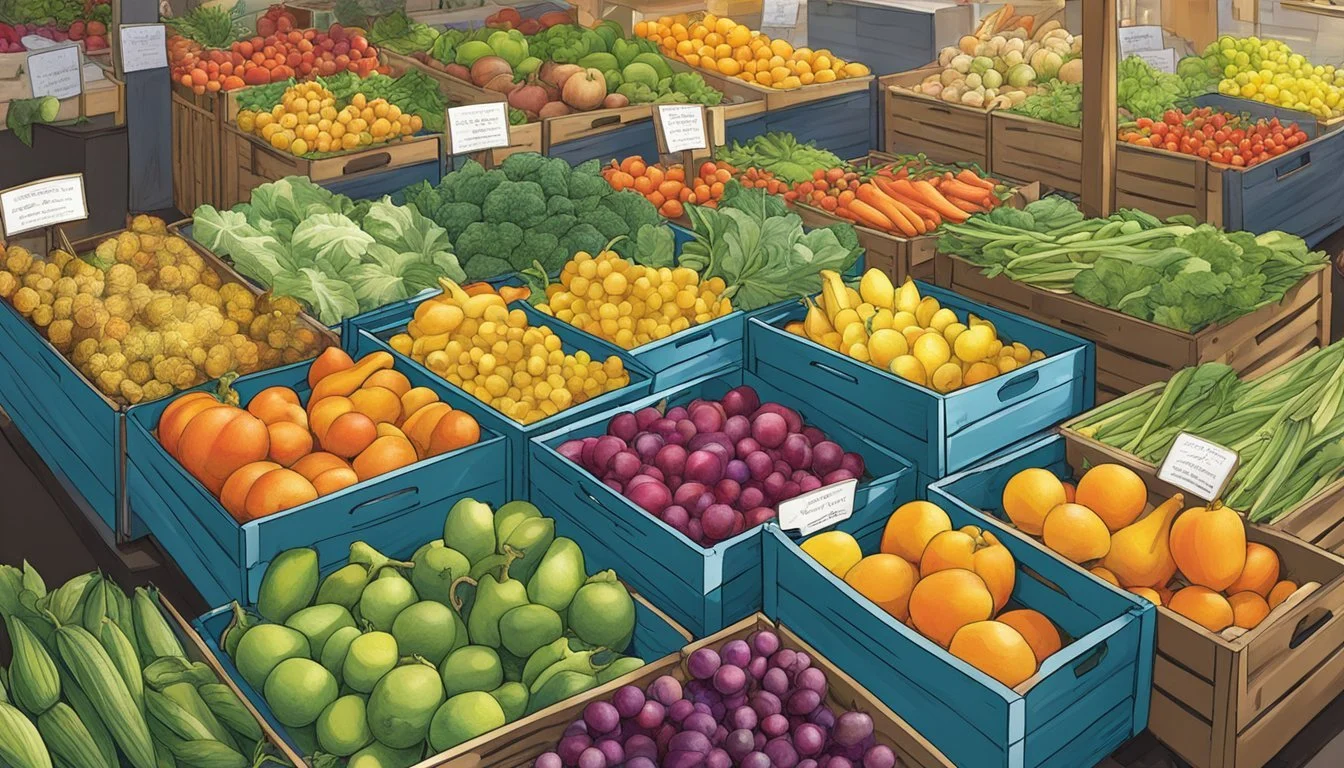Community Supported Agriculture (CSA) in Worcester, MA
A Guide to Local Farm Partnerships
Community Supported Agriculture, commonly known as CSA, has established a strong presence in Worcester, Massachusetts, fostering a connection between local farmers and the community. This mutually beneficial arrangement allows residents to share in the bounty of the harvest through a subscription-based model. Members pay in advance for a season's worth of produce, guaranteeing them a weekly share of fresh, locally-grown vegetables, fruits, or herbs. In addition to supporting sustainable farming practices, CSA programs often enhance food security and promote educational opportunities regarding agricultural and environmental stewardship.
Some CSA farms near Worcester accommodate diverse customer needs by offering flexible payment plans and accepting SNAP benefits, thus making fresh, nutrient-dense foods more accessible. CSA members may also have the opportunity to engage directly with agriculture by contributing a small number of work hours at the farm. This hands-on experience enriches the community’s understanding of farming and reinforces the value of locally sourced food.
With an array of CSA options available, including specialized shares for mushrooms, fruit, and flowers, Worcester residents can tailor their participation to their interests. The growth of CSAs in the area emphasizes Worcester's commitment to building a resilient local food system that prioritizes health, sustainability, and strong farmer-consumer relationships.
Community Supported Agriculture (CSA) Overview
Community Supported Agriculture (CSA) in Worcester, MA, connects consumers with local farms through a membership model, ensuring a supply of local food while supporting agricultural producers.
Definition and Principles
Community Supported Agriculture (CSA) is a socioeconomic model where consumers purchase shares, or "memberships," in a farm’s upcoming harvest. It fosters a relationship between the community and the farm, creating a mutually beneficial arrangement. Members pay in advance for a season of produce, which grants them a regular allotment of fresh, seasonal food, typically distributed weekly.
Benefits of Joining a CSA
Benefits for members include access to high-quality, fresh produce as well as the opportunity to support local farmers directly. This relationship helps to sustain the local food ecosystem and can encourage healthier eating habits through the consumption of seasonal goods. Consumers often appreciate the transparency and traceability of their food source.
History and Evolution in New England
The CSA model has roots in cooperative movements in Europe and Japan and has evolved in New England since its introduction. It has grown from a small number of farms in the 1980s to many farms now offering CSA memberships. This evolution reflects a growing appreciation for sustainable agricultural practices and community-based food systems.
CSA Models and Structures
In Worcester, MA, various Community Supported Agriculture (CSA) models cater to the preferences of consumers and farmers alike, each providing unique ways to engage with and support local agriculture.
Traditional Share-Based Model
The traditional share-based CSA model operates on a subscription-like basis where members, often referred to as shareholders, pay in advance for a season's worth of agricultural products. This investment provides the farmer with working capital at the start of the season, and shareholders receive weekly or bi-weekly shares of the farm's output, which typically includes a variety of vegetables, fruits, and herbs. Some CSAs may also include other farm products such as eggs and honey. The upfront payment model binds the community and the farm in a mutual relationship of risk-sharing and reward.
Market-Style CSA Programs
Market-style CSA programs diverge from the traditional model by allowing more flexibility for shareholders. Instead of receiving a predetermined share, members have the option to use their subscription like a debit account at the farm's stand or at a designated farmers' market. This flexibility allows consumers to choose the products they want while still committing to the economic support of the community farm. It's a model that can be particularly appealing to those who prefer to tailor their weekly produce selection.
CSA Contributions to Local Food Hubs
CSAs contribute significantly to local food hubs by providing a reliable source of fresh, local produce. A food hub acts as an aggregator, distributor, and marketer of local foods, and CSAs can play a vital role in supplying these hubs with high-quality, organically grown fare. The collaboration between CSAs and local food hubs ensures that a more significant portion of the food consumed in the community comes from trusted, nearby sources, thereby strengthening the local food system.
The diverse structures of CSA programs within the Worcester area offer community members a range of opportunities to engage in local food systems and support sustainable agricultural practices, all while enjoying fresh and nutritious food grown close to home.
Participating in Worcester's CSA
Worcester residents have the opportunity to access fresh, locally-sourced produce through various CSA programs. Members typically commit to a season of produce in advance, supporting local farms and enjoying a bountiful harvest.
Finding Local CSA Farms
In Worcester, individuals can find a range of CSA farms that offer fresh produce. One such example is the CSA program through the Massachusetts local agricultural network. These farms provide convenient pick-up locations within Worcester or nearby areas. An individual intending to subscribe can typically locate these farms online via local directories or by visiting the Mass.gov website for a list of CSA farms in the region.
Understanding CSA Membership Programs
Most CSA farms around Worcester operate on a membership basis. These programs usually require members to pay upfront for the entire growing season. However, some farms may offer flexibility with weekly or monthly payments. In some cases, farms may also request members to contribute a few hours of work during the season, fostering a deeper connection between consumers and the source of their food.
Seasonal Offerings and Produce Variety
CSA memberships provide a diverse array of offerings throughout the farming season. These usually include a variety of vegetables, fruit, herbs, and sometimes even flowers. The produce available is typically harvested at its peak, ensuring members receive the freshest and most flavorful items. CSA farms in Worcester region tend to offer seasonal shares from June to November, aligning with Massachusetts' growing season. This benefits members by providing them with an opportunity to enjoy the local harvest at its best.
Support and Impact on the Worcester Community
Community Supported Agriculture (CSA) models in Worcester, MA, play a pivotal role in reinforcing the local economy, promoting environmental sustainability, and bolstering educational outreach to the community through interactions with small farms.
Boosting Local Economy and Small Farms
CSAs act as economic catalysts in Worcester by channeling consumer dollars to local farms. By committing to purchase farm produce for a season, members provide farmers with a reliable income stream. Small farms, such as those near Charlton, MA, benefit from the direct patronage which, in turn, supports their curbside, self-serve stand that offers fresh, organically produced eggs and honey.
Education and Community Engagement
Local CSAs serve as educational hubs that advance knowledge about sustainable agriculture. Through the hands-on requirement for members to contribute hours on the farm, individuals gain a deeper understanding of farming practices and the value of locally sourced food. Urban agriculture initiatives, like Eastie Farm, further community engagement by addressing food security concerns in East Boston and offering CSA shares that include produce, eggs, and specialty items from over 50 local farms.
Environmental and Sustainability Benefits
Worcester's CSA farms emphasize environmental justice and sustainability by implementing practices that benefit the ecosystem. These practices, meticulous in their execution, often lead to the use of fewer harmful pesticides and the promotion of biodiversity. Farms engaging in CSA programs, such as those in Worcester County, also work as stewards of the land, reducing carbon footprints through minimized food transport and encouragement of organic farming methods.
Agricultural Practices and CSA Operations
In Worcester, MA, Community Supported Agriculture (CSA) operations implement a range of agricultural practices centered on sustainability and resource efficiency. These practices play a crucial role in the success and ecological impact of CSAs in the region.
Organic and Regenerative Farming
Organic farms in Worcester employ methods that meet certified organic standards, avoiding synthetic pesticides and fertilizers, and instead using natural alternatives. This focus ensures that crops are grown in a manner that promotes the health of both consumers and the environment. CSAs utilize regenerative farming techniques, which aim to enhance and sustain the health of the soil. This approach includes crop rotation, cover cropping, and conservation tillage to maintain soil vitality.
The Importance of Water Management
Effective water management is vital for CSA operations. Farms utilize practices such as drip irrigation and rainwater harvesting to optimize water use and reduce wastage. These practices are essential for sustaining crops during dry periods while protecting local water resources from overexploitation.
Labor and Farm Management
Managing a CSA requires a coordinated effort in terms of labor and overall farm operations. Farm workers are often involved in planning, planting, harvesting, and distribution processes. Labor on organic farms emphasizes hand weeding and the use of tool-based tillage to preserve soil structure and prevent contamination. Efficient farm management ensures that these labor-intensive practices are conducted in an organized manner for the CSA to thrive.
CSA Logistics and Member Responsibilities
Community Supported Agriculture (CSA) in Worcester, MA, presents an organized system for residents to obtain fresh, local produce while supporting local farmers. Members typically receive their shares through specified pick-up locations or delivery options and are expected to understand the concept of shared risk inherent in CSA models. Consistent communication and providing feedback are essential for the betterment of the CSA experience.
Pick-Up Locations and Delivery Options
Pick-up: Members are often expected to collect their CSA shares from designated pick-up locations. These locations might be set within the community, like local farmers' markets, designated drop-off points, or at the farm itself. Each farm may have its specific schedule and hours of operation for pick-ups, which members agree to adhere to.
Delivery: Some CSA programs offer the convenience of delivery. This could be a direct-to-doorstep service or delivered to a central community location where members can then collect their shares. Delivery options could incur additional costs and might be available on a weekly or bi-weekly basis.
Understanding Shared Risk
In a CSA model, members not only share in the bounty of the harvest but also in the risks. Agriculture is subject to many variables, including weather, pests, and disease, which can affect crop yields. By purchasing a share in the CSA, members:
Acknowledge: They understand the inherent risks.
Support: Their upfront payment contributes to the farm's operating costs, regardless of the season's success.
Communication and Providing Feedback
Communication: Ongoing dialogue between the farmer and CSA members is crucial. It can include updates on crop progress, changes in pick-up times or locations, and announcements regarding surplus produce or unexpected shortages.
Feedback: CSA members are encouraged to provide their honest feedback about the produce and the CSA operations. This can be done through:
Surveys: Formal ways to gauge member satisfaction and suggestions for improvement.
Direct Communication: Informal discussions, emails, or meeting with farmers to discuss the CSA experience.
Regular feedback helps to foster a sense of community and partnership, leading to a CSA that best serves the needs of both the farmers and its members.
Additional Products and Services Offered by CSAs
Community Supported Agriculture in Worcester, MA is not just about vegetables and fruits. Many CSAs in the area have diversified their offerings, providing members with a variety of local products and engaging services.
Inclusion of Meat, Eggs, and Dairy
CSAs recognize the demand for locally sourced meat, eggs, and dairy products. They ensure these items come from animals raised using ethical farming practices. This not only supports humane treatment of livestock but also assures members of high-quality, farm-fresh produce.
Meat: Often available as a separate share or as an add-on, including a variety of beef, pork, chicken, and sometimes lamb.
Eggs: Regularly offered and appreciated for their freshness and rich flavor, coming from free-range chickens.
Dairy: Includes milk, cheese, and yogurt, typically sourced from nearby dairy farms committed to natural, hormone-free farming methods.
Offering Cooking Classes and Recipes
To help members make the most of their seasonal shares, CSAs in Worcester often provide cooking classes and recipes. This educational aspect allows members to explore new cuisines and ensures they can fully enjoy their CSA produce.
Cooking Classes: Hands-on instruction covering everything from basic techniques to gourmet meals, tailored to the CSA's product offerings.
Recipes: Often catered to what is currently in season, enabling members to utilize the freshest ingredients in their cooking endeavors.
Partnerships with Local Food Banks and Charities
CSAs in Worcester demonstrate community spirit through partnerships with local food banks and charities. These collaborations help to ensure that surplus produce reaches those in need, thereby reducing waste and supporting food security within the community.
Food Bank Contributions: Surplus goods like vegetables, fruits, and even flowers are often donated to food banks, offering nutritious options to those facing food scarcity.
Charity Engagements: CSAs may also support local charities through fundraising events or by donating a portion of the CSA share proceeds, fostering a cycle of giving within the Worcester area.
These additional offerings exemplify how CSAs in Worcester, MA go beyond just farming—they create a comprehensive food experience and nurture a caring community.
Financial Aspects of CSA Membership
Community Supported Agriculture (CSA) memberships in Worcester, MA are financial agreements that effectually blend upfront investment with seasonal food consumption. Understanding the financial layout aids members in making informed decisions.
Understanding Monthly Payments and Costs
Members often have the option of monthly payments, facilitating a spread-out cost rather than a lump sum. Monthly costs can vary, typically depending on the quantity and type of produce. A standard CSA share in Worcester might include 10-20 pounds of assorted local produce each period, influencing the monthly payment amount.
Financial Commitment and Membership Cycles
Membership cycles usually align with the growing season, requiring members to commit financially to the entire period. This advance commitment ensures that farmers have a reliable income to cover their seasonal production costs. In return, members receive regular allotments of fresh produce throughout the season, which are characterized as shares.
Supporting CSA through Additional Purchases
Members can often support their local CSA further through additional purchases, such as eggs, honey, or specialty farm products. These purchases, while not mandatory, augment the core offerings and provide a way for members to enjoy a greater variety of local goods.
Each financial transaction within the CSA model in Worcester, MA solidifies the bond between consumers and local agriculture, ensuring that the community reaps the benefits of a sustainable food system.
Spotlights on Notable Worcester Area CSAs
Worcester, MA offers a variety of community-supported agriculture programs that provide fresh, locally-grown produce to the community. These CSA programs allow members to purchase shares of a farm's harvest in advance, giving them a connection to the local land and its seasons.
Sunderland's Warner Farm
Warner Farm, located in Sunderland, MA, has a heritage that spans over 300 years and ten generations. They offer a CSA program that allows members to enjoy a wide variety of fruits and vegetables. The farm utilizes integrated pest management practices to ensure sustainable crop production.
Here are some key features of Warner Farm's CSA:
Variety of Shares: Offers different sizes to suit various household needs.
Pick-up Options: Convenient locations for members to collect their produce.
Barre's Red Fire Farm
Red Fire Farm in Barre is known for their organic farming practices and diversified produce offerings. Their commitment to ecological farming has contributed to a flourishing local food culture. The farm grows over 100 varieties of vegetables, fruits, herbs, and flowers.
Red Fire Farm's CSA highlights include:
Organic Certification: Upholds high standards for organic agriculture.
Extensive Selection: Members enjoy an array of farm-fresh products from their seasonal harvest.
Chestnut Farms in Lancaster
Nestled in Lancaster, MA, Chestnut Farms is dedicated to raising livestock sustainably and humanely. While not a traditional vegetable CSA, they provide a meat CSA that includes a variety of pasture-raised meats such as beef, pork, chicken, and lamb.
Chestnut Farms' meat CSA features the following:
Ethically Raised: Animals are treated with care and respect.
Flexible Shares: Meat shares are available in different sizes to accommodate family sizes and preferences.

